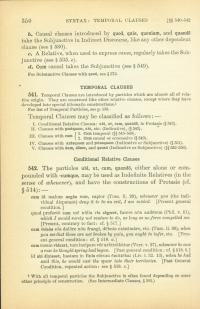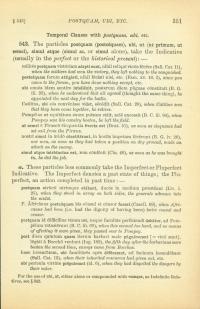541. Temporal clauses are introduced by particles which are almost all of relative origin. They are construed like other relative clauses, except where they have developed into special idiomatic constructions.1 For list of temporal particles, see § 224.II.d. Temporal clauses may be classified as follows.
- Conditional Relative Clauses: ubi, ut, cum, quandō, in protasis (§ 542, below).
- Clauses with postquam, ubi, etc. (indicative), (§ 543, below).
- Clauses with cum
a. Cum temporal (§§ 545 - 548).
b. Cum causal or concessive (§ 549). - Clauses with antequam and priusquam (indicative or subjunctive) (§ 551).
- Clauses with dum, dōnec, and quoad (indicative or subjunctive) (§§ 552 - 556).
542. The particles ubi, ut, cum, quandō, either alone or compounded with -cumque, may be used as indefinite relatives (in the sense of whenever), and have the constructions of protasis (cf. § 514).
cum id malum negāsesse, capior (Tusc. 2.29)
Whenever you (the individual disputant) deny it to be an evil, I am misled.
[present general condition]
quod profectō cum mē nūlla vīs cōgeret, facere nōn audērem (Phil. 5.51)
which I would surely not venture to do, as long as no force compelled me
[Present Contrary to Fact: cf. § 517]
Cum videās eōs dolōre nōn frangī, dēbeās exīstimāre, etc.(Tusc. 2.66)
When you see that those are not broken by pain, you ought to infer, etc.
[present general condition: cf. § 518.a.]
Cum rosam vīderat, tum incipere vēr arbitrābātur. (Verr. 5.27)
Whenever he saw a rose he thought spring had begun.
[past general condition: cf. § 518.b.]
Id ubi dīxisset, hastam in fīnīs eōrum ēmittēbat. (Liv. 1.32.13)
When he had said this, he would cast the spear into their territories.
[past general condition, repeated action: see § 518.c.]
543. The particles postquam (posteāquam), ubi, ut (ut prīmum, ut semel), simul atque (simul ac, or simul alone), take the indicative (usually in the Perfect or the Historical Present).
Mīlitēs postquam victōriam adeptī sunt, nihil reliquī victīs fēcēre. (Sall. Cat. 11)
When the soldiers had won the victory, they left nothing to the vanquished.
Posteāquam forum attigistī, nihil fēcistī nisi, etc. (Fam. 15.16.3)
Since you came to the forum, you have done nothing except, etc.
Ubi omnīs idem sentīre intellēxit, posterum diem pūgnae cōnstituit. (B. G. 3.23)
When he understood that all agreed (thought the same thing), he appointed the next day for the battle.
Catilīna, ubi eōs convēnisse videt, sēcēdit. (Sall. Cat. 20)
When Catiline sees that they have come together, he retires.
Pompêius ut equitātum suum pulsum vīdit, aciē excessit. (B. C. 3.94)
When Pompey saw his cavalry beaten, he left the field.
ut semel ē Pīraeeō ēloquentia ēvecta est (Brut. 51)
as soon as eloquence had set sail from the Pirœus.
Nostrī simul in āridō cōnstitērunt, in hostīs impetum fēcērunt. (B. G. 4.26)
Our men, as soon as they had taken a position on dry ground, made an attack on the enemy.
simul atque intrōductus est, rem cōnfēcit (Clu. 40)
As soon as he was brought in, he did the job.
a. These particles less commonly take the imperfect or pluperfect indicative. The imperfect denotes a past state of things; the Pluperfect, an action completed in past time.
Postquam strūctī utrimque stābant, ducēs in medium prōcēdunt. (Liv. 1.23)
When they stood in array on both sides, the generals advance into the midst.
P. Āfricānus posteāquam bis cōnsul et cēnsor fuerat (Caecil. 69)
when Africanus had been (i.e. had the dignity of having been) twice consul and censor.
Postquam id difficilius vīsum est, neque facultās perficiendī dabātur, ad Pompêium trānsiērunt (B. C. 3.60)
When this seemed too hard, and no means of effecting it were given, they passed over to Pompey.
Post diem quīntum quam iterum barbarī male pūgnāverant [ = victī sunt], lēgātī ā Bocchō veniunt. (Iug. 102)
The fifth day after the barbarians were beaten the second time, envoys come from Bocchus.
haec iuventūtem, ubi familiārēs opēs dēfēcerant, ad facinora incendēbant (Sall. Cat. 13)
when their inherited resources had given out, etc.
ubi perīcula virtūte prōpulerant (id. 6)
when they had dispelled the dangers by their valor
For the use of ubi, ut, either alone or compounded with -cumque as indefinite relatives, see § 542 (above).


